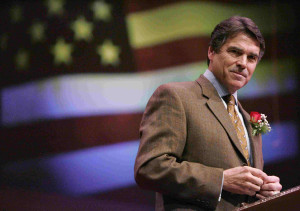Where We Should Place Our Fears
BY RAJA KRISHNA
This August, Texas Governor and presidential hopeful Rick Perry stirred up controversy when he invited his fellow Texans, along with the nation’s governors, to join him in a mammoth prayer event at Houston’s Reliant Stadium. Dubbed “The Response,” it was marketed as a plea to God to solve our nation’s grave and historic problems, was attended by over 20,000 people, and lasted more than seven hours. In the days and weeks leading up to the event, Perry was attacked relentlessly. 
“How,” asked secular advocacy groups, “can a publicly elected official possibly hold an event like this without violating the separation of church and state?”
“How,” asked non-Christian religious leaders, “are we supposed to feel included when our own governor is holding a Christian prayer session?”
“How,” asked gay rights activists, “can a governor stand on stage with religious figures whose ‘Christian values’ condemned us as human beings?”
Gauging the reactions of these groups, all of which I support, I found it odd that I wasn’t the least bit offended by Perry’s gesture. Instead, I wondered what exactly about being a governor removed Perry’s right to pray for his country in the company of his supporters. For me, the question came down to morality versus legality. Since the event was privately funded and there was a strong precedent for prayer services held by public officials, a Texas court ruled that “The Response” was not illegal; but was it immoral? Why did this seemingly innocuous mixing of religion and politics elicit such a mental gag reflex in my fellow liberals?
There is no denying that Governor Perry used his prayer event to pander to the evangelical base of his party, or that it was timed to coincide with the launch of his presidential campaign. In short, “The Response” was a blatantly political move. However, I disagree with the notion that politics was its only purpose and with the assertion that its political implications make it unacceptable. The mere presence of 20,000 individuals who took time from their various schedules to congregate and pray reveals the spiritual significance of the pray-a-thon to multitudes of Americans. It gave the public a chance to reflect on the changes that have taken place over the past decade and to pray for help if so inclined. Perry, just like any other US citizen, was perfectly free to exercise his religious views together with other individuals doing the same. If the fact that Perry is a public official makes it wrong for him to publicly pray, then President Barack Obama ending every speech to the nation with “God Bless America” and attending the National Prayer Breakfast each year of his term (like every president since Eisenhower has) is also immoral.
As a political move, “The Response” was hardly the deceptive propaganda instrument that many made it out to be. There is a practical side to politics, and politicians shouldn’t be attacked for conducting well-organized, good-natured events that energize their base.
If we want to make progress in this country, we have to pick our battles carefully. Yes, gays deserve more rights than they have. Yes, women should retain the right to abortion and the process should be made affordable for them. But if the liberal movement wants to achieve its goals, it must be careful to not confuse “Christian,” “god-fearing,” or “evangelical” with “bigoted,” “anti-abortion,” or “anti-gay.” We often forget that while conservative politicians tend to flaunt their religious beliefs more than liberal ones, all of our presidents have been Christian, at least to some degree, and have represented as many views as there were presidents. Protesting at “The Response,” like many gay activists did, is admirable but symbolically confuses Christians with anti-gay individuals. In democracies, religion does not define political ideology any more than a Southern accent does, and this assumption is something we should stay away from.
We need to acknowledge that in a country that is overwhelmingly religious, religion will inevitably seep into our everyday lives. Complaining about “The Response” is like complaining about “under God” in the Pledge of Allegiance, Christmas trees in public squares (which are backed up by the Supreme Court in Lynch v. Donnelly), or “In God We Trust” on our coins. While these all contain religious undertones, we need to zoom out. There are plenty of other places to fear religion seeping into our politics, and one of them is Congress.
An issue that truly calls for our focus is the influence of religion in policymaking. This is where we can truly draw the line between a religious citizenry and religious politicians. When constructing a policy, the ideas expressed ought to be justified with secular rationales. For example, that God supposedly disapproves of abortion is not adequate justification for a politician to propose anti-abortion legislation. Similarly, that God supposedly disapproves of homosexuality is not sufficient to justify withholding rights from the homosexual population.
Nevertheless, that is not to say that we don’t have the right to form our opinions based on our respective religions. If one’s religious beliefs truly tell them that homosexuals are an abomination to mankind (see Westboro Baptist Church), or that abortion is the devil’s work, they are perfectly entitled to justify their opinions in that way in the United States, no matter how vehemently we may disagree.
Can politicians use religious justifications for their opinions? Yes. Should a religious argument be ample rationale for legislation? No. While politicians can be, and have the right to be, influenced by their religion, policymaking must be kept secular. Liberals need to be conscious of this fact, swallow their gag reflexes, and focus on tempered, substantive discourse. Once we know where to place our fears, we can prevent them from becoming a reality.